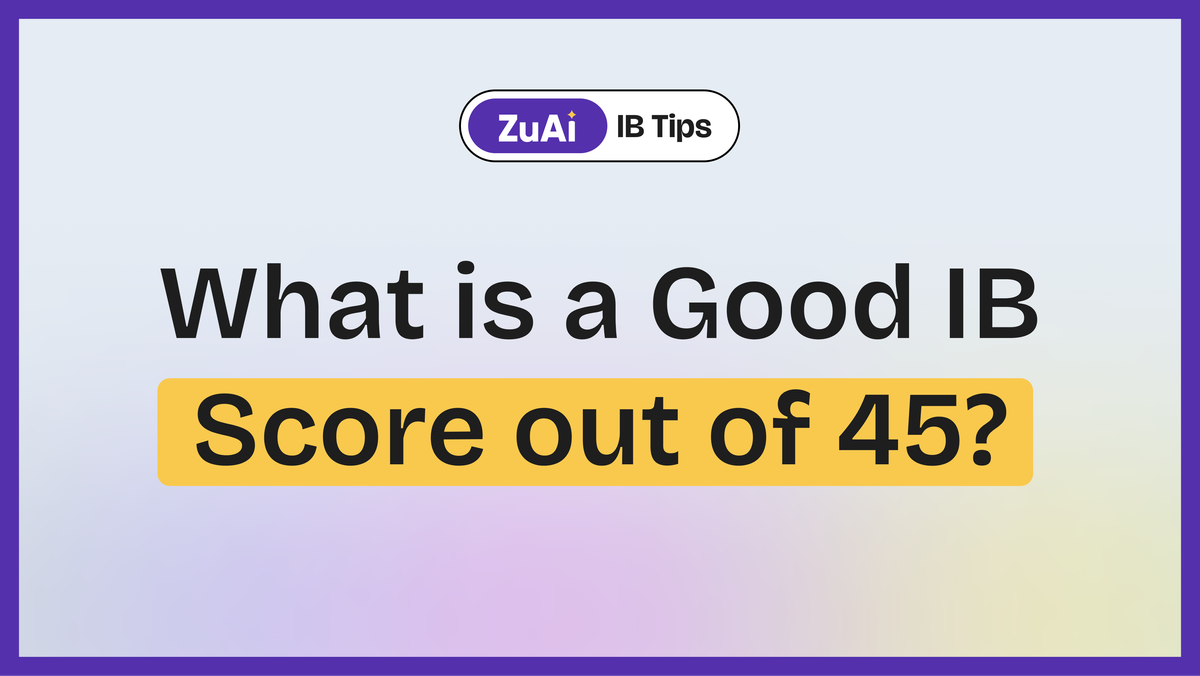What is a Good IB Score Out of 45?

Are you wondering what a good IB score out of 45 is? Whether you're an IB student aiming for top universities or just curious about the scoring system, this guide will help you understand everything you need to know. Let's dive in!
Understanding the IB Scoring System
How is the IB Score Calculated?
The International Baccalaureate (IB) program is known for its rigorous curriculum and holistic approach to education. Each IB student takes six subjects, with each subject graded on a scale of 1 to 7. In addition to these, students can earn up to 3 extra points through their Extended Essay (EE) and Theory of Knowledge (TOK) assessments. This brings the total possible score to 45 points.
What is a Good IB Score Out of 45?
In general, a score above 30 is considered good, as it indicates a strong understanding of the subjects. However, to be more competitive for top-tier universities, especially Ivy League schools, a score of 38 or higher is often desirable. Here's a breakdown:
- 30-35: Good, above average
- 36-38: Very good, competitive for many universities
- 39-41: Excellent, highly competitive
- 42-45: Outstanding, top 1% of all IB students
Why is a Good IB Score Important?
College Admissions
A high IB score can significantly boost your college applications. Universities recognize the IB's challenging curriculum and regard high scores as a mark of academic excellence. Ivy League and other prestigious universities often look for scores above 38.
Scholarships and Credits
Many universities offer scholarships to students with high IB scores. Additionally, some institutions grant college credits for higher-level (HL) courses if you score well, allowing you to skip introductory courses and save on tuition fees.
Bonus Tip: AI app for IB Exams = ZuAI
It's the ultimate AI app designed to help your child excel in their IB exams. As a parent, you want the best for your child, and so do we.
ZuAI provides personalized study support, practice questions, and detailed explanations tailored specifically to the IB curriculum.
Think of it as a smart tutor that understands your child’s unique learning needs, helping them tackle challenging subjects with confidence.
With ZuAI, you can feel reassured knowing your child is getting the extra help they need to succeed and build a bright future.
We genuinely care about your child's success and are here to support them every step of the way.
Tips to Achieve a Good IB Score
1. Stay Organized
Keep track of your assignments, deadlines, and exam dates. Use planners or digital tools to manage your time effectively.
2. Understand the Assessment Criteria
Familiarize yourself with the grading rubrics for your subjects, EE, and TOK. Knowing what examiners look for can help you tailor your work to meet those criteria.
3. Seek Help When Needed
Don’t hesitate to ask teachers or peers for help if you're struggling with a topic. Joining study groups can also provide additional support and motivation.
4. Practice Past Papers
Regularly practicing past exam papers can help you get used to the format and timing of the exams. It also highlights areas where you need improvement.
FAQs
What is the Average IB Score?
The global average IB score typically ranges between 29 and 31. Achieving above this range places you in a strong position.
Is 35 a Good IB Score?
Yes, a score of 35 is considered good and is above the global average. It demonstrates solid academic performance and can be competitive for many universities.
How Can I Convert My IB Score to a Percentage?
There isn't a direct conversion from IB scores to percentage. However, many institutions provide guidelines for approximate conversions. Generally, an IB score of 6 or 7 in a subject is comparable to an A grade in traditional grading systems.
Is 3 a Passing Grade in IB?
Yes, a score of 3 is a passing grade, but it indicates a basic level of understanding. For most subjects, a score of 4 or above is generally considered satisfactory.
What is the Highest Possible IB Score?
The highest possible IB score is 45, which is achieved by scoring 7 in each of the six subjects and obtaining the maximum 3 extra points from the EE and TOK assessments.
